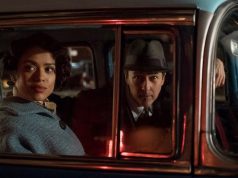I was born in 1974, so I have no actual memories of the Vietnam War. Everything I know about it, I learned second-hand, after the fact.
I think that prevents me from fully grasping the weight of “The Fog of War,” Errol Morris’ striking documentary about Robert S. McNamara, Secretary of Defense from 1962-68, and so-called “architect of the Vietnam War.” I gather that for those who lived in the ’60s and heard news of the war on a daily basis, McNamara was as large a part of the cultural consciousness as the presidents were. But for me, born later and without a direct parallel from my own generation, I don’t have the frame of reference necessary to understand, without being told, why a film interviewing McNamara is any more noteworthy than one interviewing any other political figure from that era.
So here are these reviews, many of them rapturous, written by critics who obviously have a greater connection to McNamara than I do. The film assumes the viewer wants to hear McNamara explain himself, because the film also assumes that Vietnam was a colossal mistake. I think I agree with that, but again, only well after the fact, and only as information has been filtered through the countless books, films, TV shows and Broadway musicals about Vietnam that have been produced in the past 30 years. Would I have been against the war if I’d lived through it? Would I have reviled this hawkish McNamara as nothing but a warmonger? Would I be eager, now, to see a documentary pin him down and get some straight answers?
The answer to the last question is yes; even as someone who merely loves documentaries and has a moderate interest in history, I find “The Fog of War” to be unflaggingly interesting. McNamara, now a sprightly 85, tells his life story ably, with details from his early life providing background.
He worked in the Air Force in World War II under Curtis LeMay, and it was McNamara’s expertise in areas of efficiency that made it possible to kill 100,000 people overnight with the firebombing of Tokyo. “He and I were behaving as war criminals,” McNamara says, and this is one of the instances when Morris holds his camera on McNamara’s face long enough to see that his old eyes are dimmed by something that looks like sadness.
He worked for Ford Motor Co. after the war, discovering ways to reduce injuries in car accidents, and was subsequently recruited by JFK to be his Secretary of Defense. He and Kennedy saw eye-to-eye on a lot of things and became true friends. McNamara reports it was he who chose the president’s burial plot in Arlington.
Johnson was another matter. He was more war-like than JFK had been, and apparently more than McNamara chose to be. McNamara says that in both men’s cases, his job as Secretary of Defense was simply to help his presidents meet their objectives — which sounds a little too close to “I was just following orders” for my comfort. Throughout the film, McNamara discusses what happened, even expresses regret for some things, but always stops short of taking full responsibility. He insists it’s impossible to know what to do about a war when you’re in the midst of it, because war is chaotic, unnatural and unpredictable. The best you can do is look back in hindsight and hope you did it right.
Morris, whose last film, “Mr. Death,” was an even more compelling examination of a controversial and unusual man (an expert in capital punishment who came to believe the Holocaust did not occur), has a knack for expressing things visually, even when the narrative is nothing more than an old man talking. Stock footage, phone recordings, symbolic pictures and dozens of other devices are used to make McNamara’s recollections and explanations take form. What McNamara says may not shake me to my very soul, but it’s assembled as sharply and savvily as a documentary-viewer could want.
B+ (1 hr., 46 min.; )





